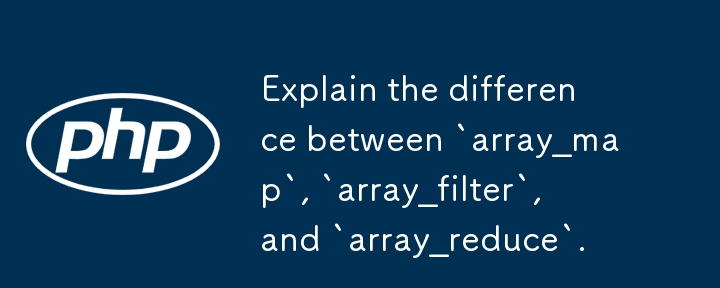 Backend Development
Backend Development
 PHP Tutorial
PHP Tutorial
 Explain the difference between `array_map`, `array_filter`, and `array_reduce`.
Explain the difference between `array_map`, `array_filter`, and `array_reduce`.
Explain the difference between `array_map`, `array_filter`, and `array_reduce`.
array_map transforms each element, returning a new array with the same number of elements; array_filter selects elements based on a condition, returning a new array with fewer or equal elements; array_reduce combines all elements into a single value.

The functions array_map, array_filter, and array_reduce are all built-in PHP functions used to process arrays, but they serve different purposes and return different results. Here's how they differ:

array_map — Transform Each Element
This function applies a callback to every element in one or more arrays and returns a new array with the transformed values.
- Use it when you want to change or transform each item.
- The returned array has the same number of elements as the input (unless multiple arrays are passed with different lengths).
- Example: doubling numbers, formatting strings.
$numbers = [1, 2, 3, 4]; $doubled = array_map(fn($n) => $n * 2, $numbers); // Result: [2, 4, 6, 8]
array_filter — Keep or Remove Elements
This function goes through each element and decides whether to keep it based on a condition in the callback.

- Use it when you want to remove unwanted elements.
- The returned array contains only the elements that pass the condition.
- Example: filtering out odd numbers, removing empty values.
$numbers = [1, 2, 3, 4, 5]; $evens = array_filter($numbers, fn($n) => $n % 2 === 0); // Result: [2, 4]
Note: Keys are preserved. Use array_values() afterward if you want reindexed numeric keys.
array_reduce — Combine All Elements into One Value
This function processes the array and reduces it to a single value (which can be a number, string, array, etc.).

- Use it when you want to accumulate or summarize data.
- It applies a callback that takes an accumulator and the current item, returning the new accumulator.
- Example: summing values, concatenating strings, building a summary.
$numbers = [1, 2, 3, 4]; $sum = array_reduce($numbers, fn($carry, $item) => $carry $item, 0); // Result: 10
The third parameter is the initial value of $carry. If omitted, the first element is used (and iteration starts from the second).
Summary of Differences
| Function | Purpose | Return Value | Number of Output Elements |
|---|---|---|---|
array_map |
Transform each item | New array | Same as input |
array_filter |
Select certain items | New array | Less than or equal to input |
array_reduce |
Combine into one value | Single value (any type) | One value |
Each is useful in functional programming style to avoid manual loops and make code more expressive.
Basically:
- Map changes everything.
- Filter selects some.
- Reduce rolls everything into one.
The above is the detailed content of Explain the difference between `array_map`, `array_filter`, and `array_reduce`.. For more information, please follow other related articles on the PHP Chinese website!

Hot AI Tools

Undress AI Tool
Undress images for free

Undresser.AI Undress
AI-powered app for creating realistic nude photos

AI Clothes Remover
Online AI tool for removing clothes from photos.

ArtGPT
AI image generator for creative art from text prompts.

Stock Market GPT
AI powered investment research for smarter decisions

Hot Article

Hot Tools

Notepad++7.3.1
Easy-to-use and free code editor

SublimeText3 Chinese version
Chinese version, very easy to use

Zend Studio 13.0.1
Powerful PHP integrated development environment

Dreamweaver CS6
Visual web development tools

SublimeText3 Mac version
God-level code editing software (SublimeText3)
 How to implement a singleton pattern in PHP?
Sep 25, 2025 am 12:27 AM
How to implement a singleton pattern in PHP?
Sep 25, 2025 am 12:27 AM
Singleton pattern ensures that a class has only one instance and provides a global access point for scenarios where a single object coordinates the operation of the system, such as database connections or configuration management. 2. Its basic structure includes: private static attribute storage instances, private constructors prevent external creation, private cloning methods prevent copying, and public static methods (such as getInstance()) for obtaining instances. 3. Get a unique instance in PHP by calling getInstance() method, and returns the same object reference no matter how many times it is called. 4. Under the standard PHP request model, thread safety is not necessary to be considered, but synchronization issues need to be paid attention to in long run or multi-threaded environments, and PHP itself does not support native lock mechanism. 5. Although singletons are useful,
 How to use the null coalescing operator (??) in PHP?
Sep 25, 2025 am 01:28 AM
How to use the null coalescing operator (??) in PHP?
Sep 25, 2025 am 01:28 AM
Answer: PHP's empty merge operator (??) is used to check whether a variable or array key exists and is not null. If it is true, it returns its value, otherwise it returns the default value. It avoids the use of lengthy isset() checks, is suitable for handling undefined variables and array keys, such as $username=$userInput??'guest', and supports chain calls, such as $theme=$userTheme??$defaultTheme??'dark', which is especially suitable for form, configuration, and user input processing, but only excludes null values, empty strings, 0 or false are considered valid values to return.
 How to get URL parameters in PHP?
Sep 24, 2025 am 05:11 AM
How to get URL parameters in PHP?
Sep 24, 2025 am 05:11 AM
Use $_GET to get URL parameters, such as ?name=John&age=25; check existence through isset or empty merge operators, and filter and verify data with filter_input to ensure security.
 How to download a file from a URL in PHP?
Sep 24, 2025 am 05:45 AM
How to download a file from a URL in PHP?
Sep 24, 2025 am 05:45 AM
Answer: Use file_get_contents and cURL to download URL files, the former is simple but restricted, while the latter is more flexible and supports streaming. Examples include directly reading and writing files, cURL initialization setting options and saving, adding error handling and HTTP status checking. Large files are recommended to stream download in blocks to save memory, ensuring that the directory is writable and handle exceptions properly.
 How to disable a function in PHP?
Sep 24, 2025 am 02:40 AM
How to disable a function in PHP?
Sep 24, 2025 am 02:40 AM
TodisableaPHPfunction,usedisable_functionsinphp.iniforbuilt-infunctionslikeexecorsystem,whichblocksthemgloballyforsecurity;foruser-definedfunctions,preventexecutionbywrappingtheminconditions,renaming,commentingout,orcontrollingfileinclusionviaautoloa
 How to implement an interface in a PHP class?
Sep 25, 2025 am 05:34 AM
How to implement an interface in a PHP class?
Sep 25, 2025 am 05:34 AM
Use the implements keyword to implement the interface, and the class must provide specific implementations of all methods in the interface. 2. Define the interface to declare the method using the interface keyword. 3. Class implements interface and overrides methods. 4. Create an object and call the method to output the result. 5. A class can implement multiple interfaces to ensure code specification and maintainability.
 How to sanitize user input to prevent XSS in PHP?
Sep 25, 2025 am 05:19 AM
How to sanitize user input to prevent XSS in PHP?
Sep 25, 2025 am 05:19 AM
TopreventXSSinPHP,sanitizeuserinputandescapeoutputbasedoncontextusinghtmlspecialchars()forHTML,json_encode()forJavaScript,andvalidatestrictlywithfilter_var()forexpecteddatatypes,whileavoidingdeprecatedfunctionsandusingContent-Security-Policyheadersfo
 How to use GET and POST methods in an HTML form with PHP?
Sep 25, 2025 am 03:46 AM
How to use GET and POST methods in an HTML form with PHP?
Sep 25, 2025 am 03:46 AM
The GET method attaches data to the URL, which is suitable for non-sensitive information; the POST method sends data through the request body, which is more secure and suitable for sensitive information.




